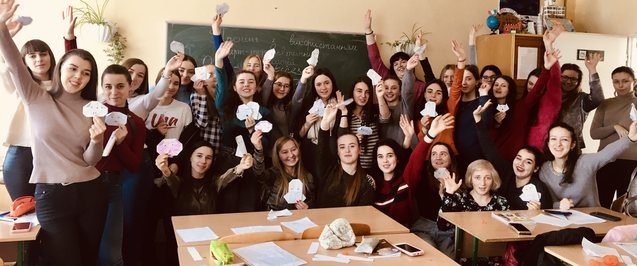Читати більше
Inclusive education teacher training curriculum: the future has started
If you want to spread progressive ideas, help the world to be a great place for everyone – do consider education as the driver for positive changes. All aspects of social life are interrelated – politicians make laws, police reinforce them, lawyers make sure they are observed, engineers design cities and things, teachers form and nurture young minds – every adult went to school before starting a career and nearly everyone remembers the name of the first teacher and the lessons of humanity, support and cooperation he or she introduced.
Inclusion of persons with disability is a step towards just and thus united society, a global trend and something that many Ukraine’s teachers suddenly came across recently (but accepted the challenge with honor and dignity).
The UN Convention on the Rights of Persons with Disabilities was adopted on 13 December 2006 at the United Nations Headquarters and was ratified by the Ukrainian Parliament in 2009. In March 2010, this legislation came into force and currently regulates national law pertaining to the rights of persons with disabilities in the country. Despite both international and national legislation now in effect, implementation of inclusive education practices needs passion, effort, determination and shared vision of society. Education demands reforms in acceptance students with disabilities and the changes should be evidence-based, well-planed, guided, monitored, supported and assessed.
The project WITHOUT BORDERS: SUSTAINING AND SUPPORTING INCLUSIVE EDUCATION LEARNING COMMUNITY aims at developing and sustaining a coordinated program of training, networking and sharing of information, modeling of best inclusive practices, and providing feedback on their implementation in kindergartens, schools and universities among teachers, specialists, NGO staff, and parents of children and young adults with disabilities.
Empowered by participation in the Americans with Disabilities Act (ADA) Anniversary Inclusive Education Fellowship Program educators from Ukraine Nadia Datso, Olha Telna, Nadia Vesnina, Valentyna Malanchii and Sergiy Sydoriv assisted by Brian Abery, Renáta Tichá and their colleagues from the Global Resource Center on Inclusive Education at the Institute on Community Integration at the University of Minnesota and supported by the Public Affairs Section of the U.S. Embassy launched a project, one of the goals of which was to develop and sustain a coordinated training program focused on the high fidelity implementation of promising and evidenced-based inclusive education practices.
In order to address the needs of teachers, students and parents a series of preliminary focus groups were conducted in Ivano-Frankivsk, Khmelnytskiy, Kharkiv, Dnipro and Lviv regions to discuss training and resource needs, as well as successes and barriers to the implementation of inclusive education practices. The resulted recommendations were transcribed, translated, analyzed and shared via a created web-site inclusion.org.ua and social networks so that they are easily accessible both by domestic and international stakeholders. Thus, a dynamic, inclusive education learning community of diverse education professionals to work with students with disabilities and their parents has been created and supported with the overall goal of enhancing the implementation of inclusive education practices across Ukraine and internationally.
In 2018 the Ukrainian National Inclusive Education Consortium was created to provide leadership and resources to further the advancement of inclusive education. The nine partner universities that conduct intensive in-service and pre-service training of inclusive education professionals wishing to strengthen their academic and scholarly links and cooperation agree to enter Memorandum of Agreement: Ivano-Frankivsk college of Vasyl Stefanyk Precarpathian national university, Kharkiv humanitarian pedagogical academy, Khmelnytskiy humanitarian pedagogical academy, Lviv Ivan Franko national university, Lviv polytechnic national university, Pereiaslav-Khmelnytskyi Hryhorii Skovoroda state pedagogical university, Poltava V.G.Korolenko national pedagogical university (later National University «Yuri Kondratyuk Poltava Polytechnic»), Kherson state university and Global Resource Center on Inclusive Education, Institute on Community Integration, University of Minnesota. The institutions cooperate in the following areas: implementation of inclusive education policy and practices with the capacity to produce new educators with an understanding of and ability to effectively implement inclusive education practices; development of an inclusive education teacher training curriculum for use at collaborating universities and for in-service training. Coursework will be practical in nature, geared toward both special and general education staff, and focus on promising and evidenced-based inclusive education practices including: collaboration within multidisciplinary teams, differentiated instruction, progress monitoring, response to intervention, and universal design for learning, supporting student self-determination, and social inclusion; provision of resource and information support of inclusion in preschool, school, vocational and university education, including content for Ukrainian Inclusive Education Website.
In order to equip practicing teachers, specialists, and parents as well as teachers-in-training with the theory and practical technique the project participants initiated and composed an inclusive education implementation manual «Stairway to Inclusion» drawing extensively from the field of implementation science and focusing on practical steps needed to create systems-level change in schools and society. The topics covered were: the universal design for learning; cooperation of a multidisciplinary team of specialists in inclusive settings; transition from school to adulthood; building professional and psychological capacity of teachers for working in inclusive settings; positive behavior support and management; aspects of teaching hard of hearing students; making a partnership with parents. The manual chapters and the further resources developed by the U.S. and Ukrainian experts were the basis for conducting regional workshops and seminars in schools, universities and NGOs for pre-service and practicing teachers, specialists, and parents and composed the coordinated program of training, networking and sharing of information, modeling of best practices, and providing feedback on the implementation of inclusive practices in schools among teachers, specialists, university and NGO staff, and parents of children and young adults with disabilities.
In order to develop and adapt the relevant practices of inclusive education and gain the feedback, numerous regional workshops in cooperation with U.S. mentors have been conducted on leadership; UDL; creation of positive environments to support all students; transition programs; social inclusion; and synergy of special and inclusive education in regional cities and towns of Ukraine. The culmination has been an International conference Sustaining Inclusive Education Community: Ukraine-U.S. cooperation in the capital city of Kyiv in partnership with America House to maintain an effective cooperation between universities, schools, kindergartens, parents, NGOs and Ministry of Education.
As the outcome of the numerous stages of workshops a team of dedicated inclusive education trainers has been prepared to sustain the effort initiated through the project. The new tract for training pre-service preschool and elementary school teachers has been started in Ivano-Frankivsk college, Precarpathian national university. The project activities provide methods and practical skills to teach students with disabilities and organize seminars and conferences inviting international and domestic experts in inclusion. It should be noted that students and teachers of Ivano-Frankivsk college in cooperation with the Consortium partners conducted several students conferences, online events and developed a number of digital resources on tools for teaching children human rights, assistance with behavioral disorders, instructional strategies for inclusive education, art and music therapy and techniques, storytelling, universal design and supporting students with special educational needs as well as their parents.
The syllabi development for Inclusive education teacher training curriculum included producing, translating and adapting resources, adding training materials on the project website, analyzing the participants’ feedback. Finally, the curriculum consisting of materials for 4 courses devoted to inclusive education including: an introductory course and three additional courses focused on educational planning and collaboration; differentiated, targeted instruction; universal design for learning has been developed. The published curriculum is supported by online video modules on UDL, collaboration of a teacher and assisstant, social inclusion, IFC, co-teaching, early Intervention.. The book has been sent to libraries, universities’ departments and those who plan to use the curriculum in their work.
Let 2021 be the year of empowerment, achievements and mutual cooperation.
Умови використання матеріалів сайту
Використання матеріалів можливе лише за умови активного гіперпосилання на UaModna ( див. Правила* ). Для генерації коду посилання натисніть на кнопку
Думки, позиції, уподобання та заклики, опубліковані на нашому сайті, є власністю авторів і можуть не співпадати з поглядами редакції uamodna.com
Читати більше
Читати більше
Читати більше











